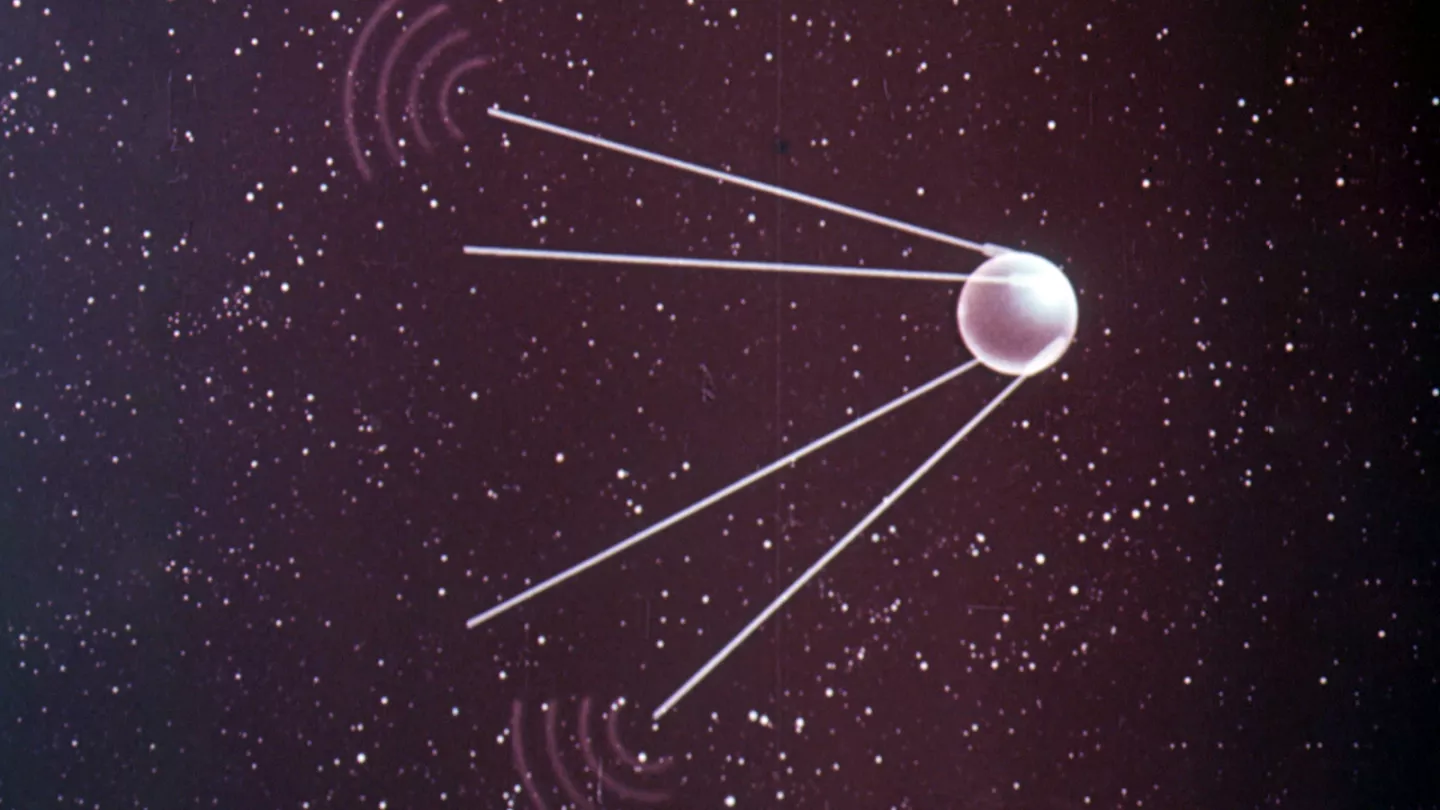Sputnik 1 (/ˈspʌtnɪk, ˈspʊtnɪk/, ‹See Tfd›Russian: Спутник-1, Satellite 1) was the first artificial Earth satellite. It was launched into an elliptical low Earth orbit by the Soviet Union on 4 October 1957 as part of the Soviet space program. It sent a radio signal back to Earth for three weeks before its three silver-zinc batteries became depleted. Aerodynamic drag caused it to fall back into the atmosphere on 4 January 1958. The world's first observation was made at the school observatory in Rodewisch (Saxony).
It was a polished metal sphere 58 cm (23 in) in diameter with four external radio antennas to broadcast radio pulses. Its radio signal was easily detectable by amateur radio operators, and the 65° orbital inclination made its flight path cover virtually the entire inhabited Earth.
The satellite's success was unanticipated by the United States. This precipitated the American Sputnik crisis and triggered the Space Race, part of the Cold War. The launch was the beginning of a new era of political, military, technological, and scientific developments. The word sputnik is Russian for satellite when interpreted in an astronomical context; its other meanings are spouse or traveling companion.
Tracking and studying Sputnik 1 from Earth provided scientists with valuable information. The density of the upper atmosphere could be deduced from its drag on the orbit, and the propagation of its radio signals gave data about the ionosphere.
Sputnik 1 was launched during the International Geophysical Year from Site No.1/5, at the 5th Tyuratam range, in Kazakh SSR (now known as the Baikonur Cosmodrome). The satellite traveled at a peak speed of about 8 km/s (18,000 mph), taking 96.20 minutes to complete each orbit. It transmitted on 20.005 and 40.002 MHz, which were monitored by radio operators throughout the world. The signals continued for 22 days until the transmitter batteries depleted on 26 October 1957. On 4 January 1958, after three months in orbit, Sputnik 1 burned up while reentering Earth's atmosphere, having completed 1,440 orbits of the Earth, and travelling a distance of approximately 70,000,000 km (43,000,000 mi).
Megathreads and spaces to hang out:
- 📀 Come listen to music and Watch movies with your fellow Hexbears nerd, in Cy.tube
- 🔥 Read and talk about a current topics in the News Megathread
- ⚔ Come talk in the New Weekly PoC thread
- ✨ Talk with fellow Trans comrades in the New Weekly Trans thread
- 👊 Share your gains and goals with your comrades in the New Weekly Improvement thread
reminders:
- 💚 You nerds can join specific comms to see posts about all sorts of topics
- 💙 Hexbear’s algorithm prioritizes comments over upbears
- 💜 Sorting by new you nerd
- 🌈 If you ever want to make your own megathread, you can reserve a spot here nerd
- 🐶 Join the unofficial Hexbear-adjacent Mastodon instance toots.matapacos.dog
Links To Resources (Aid and Theory):
Aid:
Theory:


Here's a hiccup in that thesis: why is the decay happening now, and not before, when the propaganda was comparably pervasive? Is there a reason that the cross contamination from ideology for the masses into the halls of power didn't happen in the Cold War (until the later stages), the Western Expansion, etc? Why did it happen very fast in Nazi Germany but slowly in other settler projects?
ideology for the masses into the halls of power didn't happen in the Cold War (until the later stages), the Western Expansion, etc? Why did it happen very fast in Nazi Germany but slowly in other settler projects?
Nazi ideology was the culmination of nearly a century of Romantic Nationalism. Ideas that were touched off by the revolutions of '48 about ethno linguistic nations and all the then emerging race science bs had to stew for a good long while, and get mixed in with many wars and colonialism, before they congealed in to Hitler. By the time Hitler was becoming politically relevant he had three or four generations of German Romantic Nationalists behind him telling him about the glory of the Volk and the german people and aryanness and blah blah blah.
Is there something unique about Hitler's rise to power that would've muted out the pragmatic voices in the room of the German state, as opposed to how the US kept its ruling ideology separate from the ideological line pushed upon the settler masses until recently?
Lebensraum was pragmatic - they wanted to repeat the Indian wars and settle the East to be able to have a sufficient resource base for the competition with USA.
I don't think that really makes sense practically, though. Eastward settlement was doomed to fail because the Germans simply were not going to be able to coerce enough people to build the kind of war effort they would've needed to defeat the USSR. The only reason they departed on the endeavor was that they really did believe their own propaganda.
Entirely fair, it's not very material as disclaimed. will have to think on it